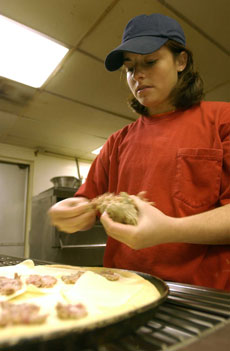Campustown businesses challenged for long-term revenue, customer base

Online Poster
April 7, 2005
With the recent closing of Sukhothai Caf‚, Champaign has to deal with yet another business closing after only being open for a few months. Other restaurants are moving in, but they question if they are doomed to repeat Sukhothai’s fate.
Sark’s Caf‚, 502 E. John St., has been open since March 4. Manager Michael Carter isn’t worried that Sark’s will have the problems Sukhothai faced because Sark’s has another location in Evanston that has been open for more than 30 years.
“We keep getting people here because they know of Sark’s from back home,” Carter said.
Unlike Sukhothai, Sark’s plans on promoting business around campus by catering to fraternities, sororities and other events. Time will only tell, though, if it will remain.
New businesses like Sark’s are not the only ones that have to worry about staying in business, however.
Get The Daily Illini in your inbox!
Garcia’s Pizza, 108 E. Green St., has been open for more than 25 years, yet employees feel business is declining. While the pizza is a hit with local residents and alumni, college students are not Garcia’s typical customers.
“Alumni still come back here because they just have to have our pizza, but it’s just not that popular for college students,” student manager Stephanie Gerritsen, senior in communications, said.
Gerritsen also said the food is too expensive for many college students, so most patrons are adults and high school students.
“During football and basketball games, we are flooded with alumni, but other than that, we are usually pretty empty,” Gerritsen said.
To avoid closing, Garcia’s uses other ways to bring in business, such as offering a drive-thru window as well as delivery options to cater to the campus.
Some businesses, though, do not find their place in the college scene.
In fall 2003, Tracy Parsons, owner of Two Main, 2 Main St., had to sell to different owners who turned it into the bar Guido’s.
“It is a tough drain personally to own a business,” Parsons said. “It takes so much time, it becomes a full-time job.”
Besides the strain of the job, Parsons said Champaign is a tough market to run a successful business and places that tend to work usually cater to the college crowd. Two Main, on the other hand, was geared toward people age 21 and older.
“We tried to be welcoming of all groups, but it’s very hard to mix college students and locals,” Parsons said.
Parsons said he believes Guido’s is successful because the new owners changed the bar’s “vibe,” and because the downtown area attracts more business, especially with the opening of condos along Main Street.
However, Parsons said it would still have hurt his business even if he tried to cater to college students.
“The college crowd is very seasonal, which does not help a business year round,” he said.
Brian Wansink, the director of the University’s Food and Brand Lab, said there are three main reasons why some businesses work while others don’t.
Wansink said having a location close to campus, understanding students better than competitors and having a big market for business are the three components to being successful on campus. To gain a big market, he said it is easier to run businesses that people already know about.
“It’s often better to keep an established business alive than to build one from scratch,” Wansink said. “You already have name recognition and an established customer base.”
Individual preferences play a role in the success of a business as well.
“Pizza has a much bigger market,” Wansink said.
Even so, it is common among all businesses that no matter what the majority of campus prefers to try and fulfill the needs of the college students.
“You have to give the campus what it wants,” Carter said. “People just want to get in, fill up on cheap, good food and get to class.”






